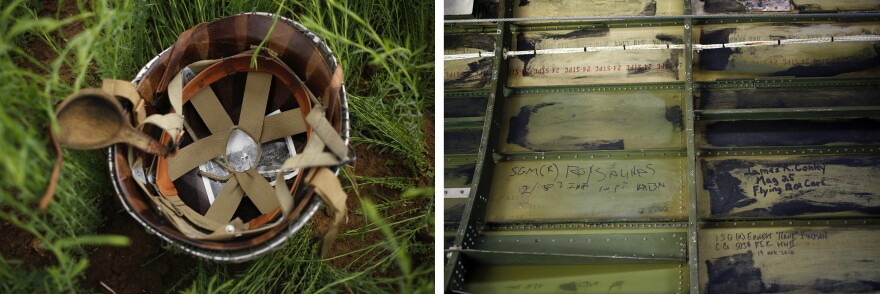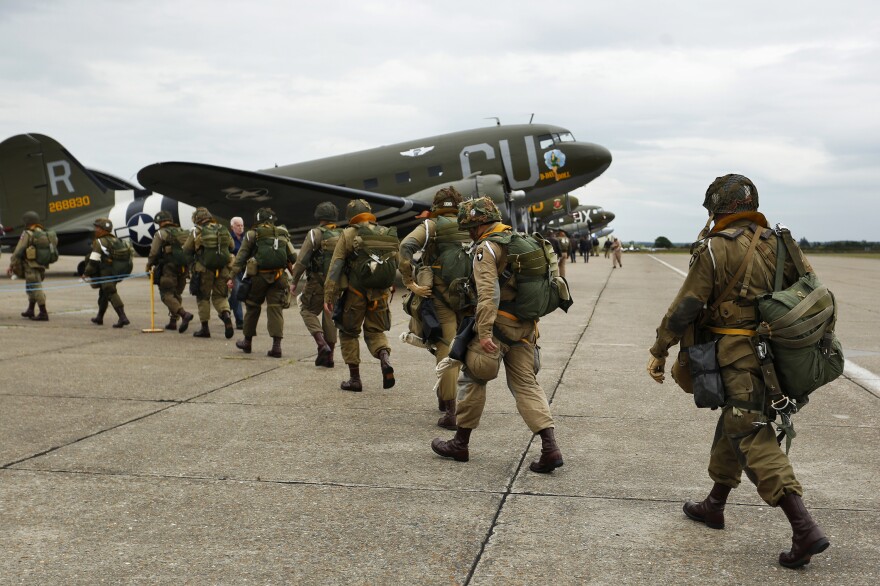is a freelance photographer and contributor to NPR. He is based in Louisville, Ky., and has had a lifelong interest in World War II.
This week, the world is marking 75 years since the D-Day invasion. On June 6, 1944, wave after wave of American, British, Canadian and French military personnel descended upon northern France's coast by air and sea in one of the largest military operations in history — a tipping point for World War II.

As the anniversary approached, I started planning a pilgrimage to the hallowed shores and hedgerows of Normandy. I needed to pay my respects to the brave men who cracked Adolf Hitler's Atlantic Wall of defenses.
This desire propelled me into the ranks of the World War II Airborne Demonstration Team. Based in Frederick, Okla., the team is a nonprofit, all-volunteer organization dedicated to remembering, honoring and serving the memory of our ever-dwindling WWII veteran population. We accomplish this by performing round-canopy static line parachute jumps dressed in authentic WWII equipment at air shows and veterans' events around the United States and Europe.

With over a year of preparation under my belt, I traveled to France with 79 of my fellow team members. Plans called for us to fly from the U.K. across the English Channel and jump into the historical Normandy drop zone this Wednesday, the day before the anniversary.
We assembled on a former Royal Air Force base in Duxford, a village south of Cambridge, England, that was ground zero for repelling the Nazi air force during the 1940 Battle of Britain. The largest gathering of surviving Douglas DC-3/C-47 Dakota aircraft in recent memory would serve as our ride across the channel.

A little like our grandfathers experienced exactly three-quarters of a century ago (but minus the stresses of deadly battle), we spent days speculating, waiting and praying for inclement weather so common to the region to disperse. Finally, the wind, rain and fog cleared and we were given the green light to go.

Weighed down with more than 70 pounds of gear and our faces blackened with charred cork, we made our way across the tarmac and formed a prayer circle to ask God's blessing on our flight and our jump. I donned my parachute and climbed aboard Placid Lassie, a vintage C-47 Skytrain that rolled off a Long Beach, Calif., aircraft assembly line in July 1943. Sitting aboard the C-47 — a D-Day veteran itself — my thoughts turned to the more than 13,000 paratroopers of the All-American 82nd Airborne and 101st Airborne "Screaming Eagles" divisions who did the same 75 years before.
The two engines sputtered to life and, in no time, we took flight. Our dark-green-painted plane climbed to 1,000 feet, its black-and-white invasion stripes glistening on the wings.
Soon we were joined by other restored troop transports with names like D-Day Doll, Aces High and Betsy's Biscuit Bomber. We set our course for Normandy with more than a dozen vintage war birds flying in formation.


Our two-hour flight from the outskirts of Cambridge across the English Channel afforded plenty of time for soul-searching. I grew up idolizing the men who willingly stepped from order into chaos at great risk to themselves. Their descent down into the dangerous unknown in the early morning hours of June 6, 1944, was a feat worth imitating in more ways than one. What darkness and malevolence did I need to confront in my own life? In what areas do I need to abandon safety or comfort and take a risk? Am I living a life worthy of their sacrifice?
Our formation passed over the beaches of Normandy and banked inland toward our drop zone outside the tiny village of Sannerville.
Finally, it was time. Our jump master yelled commands to us over the din of the engines. "Six minutes! Get ready! Stand up! Hook up! Check your equipment! One minute! Stand in the door! GO! GO! GO!"

I followed the man in front of me and launched into the slipstream behind Placid Lassie's wings. In an instant the static line went taut, deploying my parachute. My eyes took in a thoroughly surreal scene. The sky was nearly blotted out with parachute after parachute filling the airspace above the lush Normandy countryside, approximately 180 in all.
After a fleeting minute under canopy, I landed in a wheat field with a gentle thud. I thanked the Lord for bringing me safely to the ground and prayed that I might also have the fortitude to live a life marked by virtue, selflessness and courage.
Copyright 2020 NPR. To see more, visit https://www.npr.org.



